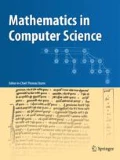This is the special issue of the 6th International Congress on Mathematical Software, a conference that was held during July 24–27, 2018 at the Department of Applied and Computational Mathematics and Statistics at the University of Notre Dame. Previous versions of the conference were held at Berlin (2016), Seoul (2014), Kobe (2010), Castro Urdiales Spain (2006) with the initial event occurring in Beijing (2002).
The driving force behind the conference is the belief that mathematical software is one of the most important current developments in mathematics, and that this phenomenon should be studied as a coherent whole. The conference served as a major forum for mathematicians, scientists, and programmers interested in the development of mathematical software.
The special issue includes contributions from nine papers. Two papers come from the area of Computational Algebraic Geometry and its applications. Brysiewicz describes numerical software, implemented in the Macaulay2 system, which gives a numerical oracle for the Newton polytope of a hypersurface. It also provides a second algorithm which functions as a tropical membership test for higher codimension varieties. The paper by Lewis gives an application of polynomial system solving with parameters to solve problems in image analysis. It compares Gröbner Basis and Dixon resultant method and discusses software constructed in Magma, Maple and Fermat.
Three papers are devoted to the general topic of logic and theorem proving. Ekici and Kaliszyk report on their work specifying foundations of category theory in Coq and illustrating its usefulness by certifying Mac Lane’s comparison theorem and its basic consequences. A second paper by Jakubuv and Kaliszyk proposes an extension to the automated theorem prover E making use of weighted path ordering. The paper by Alpuente, Ballis and Sapiña describes an assertion-guided program specialization methodology for imposing safety systems on software systems.
In the area of mathematical knowledge representation, Ber\(\check{c}\)i\(\check{c}\) and Vidali describe a new system for computer supported management of collections of combinatorial objects. The proposed project includes a data repository, a website and a SageMath package.
The paper by Kim, Pollanen, Reynolds and Burr describes their studies in understanding mathematical problem solving as done by both expert and non-experts. It makes use of eye-tracking experiments on people as they solve math problems.
The paper by Jiu and Koutschan presents software solutions for the computation of zonal polynomials, objects that appear in a wide range of applications in mathematics and statistics. The software consists of computer algebra packages, one in SageMath and the other in Mathematica.
The paper by Di Crescenzo, Khodjaeva, Khrobaei and Shpilrain discusses the important problem of group exponentiation arising in cryptosystems and puts forward efficient delegation protocols for exponentiation in general groups.
We thank Springer for approving this special issue. We thank all the speakers at the conference and the authors in this volume for their scientific contributions. We also thank all of the anonymous referees for their prompt and thorough reports, which improved the quality of the papers in this volume.
Finally, we wish to give a special thanks to Manuel Kauers for all his efforts and help in bringing this special issue to completion.
Author information
Authors and Affiliations
Corresponding author
Additional information
Publisher's Note
Springer Nature remains neutral with regard to jurisdictional claims in published maps and institutional affiliations.
Rights and permissions
About this article
Cite this article
Labahn, G., Davenport, J.H. & Urban, J. Foreword. Math.Comput.Sci. 14, 531–532 (2020). https://doi.org/10.1007/s11786-020-00475-z
Published:
Issue Date:
DOI: https://doi.org/10.1007/s11786-020-00475-z

